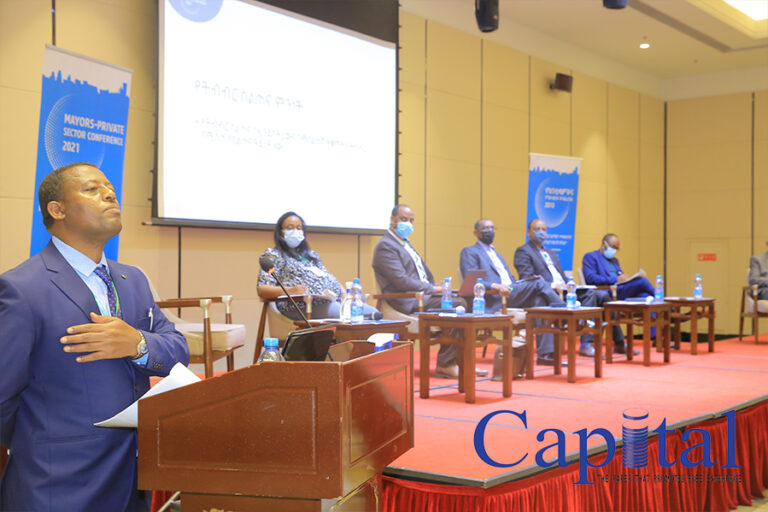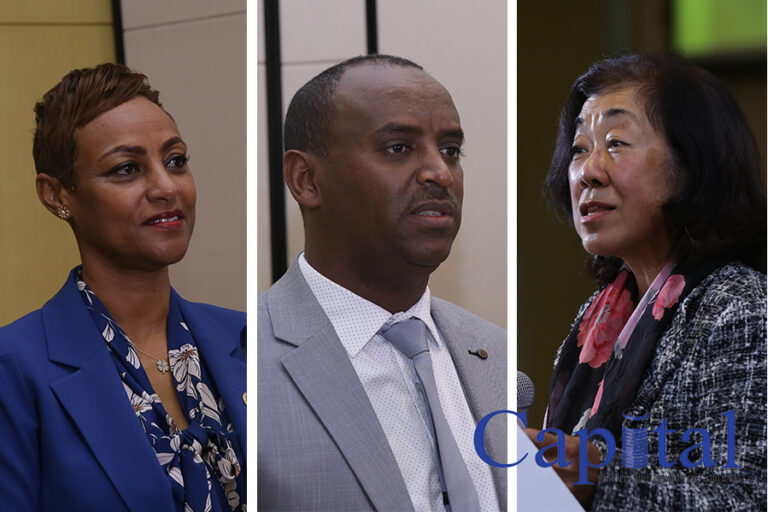April 2021 Country Level Inflation Rate raises by 19.9 percent in April 2021 as compared to last year same period according to the central statics agency.
The country level food inflation increased by 22.3 percent as compared to the one observed a year ago and Non-food inflation rate increased by 16.8 percent in April 2021 as compared to the one observed in December 2020.
The April 2021 General year-on-year inflation has increased by 19.2 percent as compared to the one observed in April 2020. The year-on-year Food inflation has increased by 21.7 percent in April 2021 as compared to the one observed in April 2020.
Cereal prices continued to increase in the current month which has great contribution for the rise of food inflation. In addition, the continued increase in the prices of edible Oil, Butter, Spices (Pepper) and coffee during the current month has contributed to an increase in the rate of inflation. Compared to last month, the prices of Kale, Onion, Garlics, Potatoes and Kocho had slightly declined.
The annual inflation rate showed an increase in the current month since prices were relatively lower in the same month last year. The Non-Food inflation showed an increase of 16.0 percent in April 2021 as compared to the one observed in April 2020.
According to the report, the rise in Non-food Inflation is mainly due to rise in the prices of Alcohol and Tobacco, Stimulants (Chat), Clothing and Footwear, Housing Repair and Maintenance (Cement and Corrugated Iron sheets), and Energy as Firewood and Charcoal, Medical care, Transport such as fuel and Jewelry including Gold.
Inflation based on comparison of April with Last month has showed an increase of 0.8 Percent as compared to the preceding month.
“The monthly inflation rate to date can be affected by seasonal and other short term effects,” the agency stated.
Similarly, the April 2021 Country Level Consumer Price Index has increased by 19.2 percent as compared to last year same period April 2020. The increase in the General Consumer Price Index is attributed to the rise observed in the indices of Food and Non-alcoholic beverages 21.7 percent, Alcoholic Beverages and Tobacco by 12.1 percent, Clothing and Footwear by 20.6 percent, House Rent, Construction Materials, Water and Fuel and Power by 9.1 percent, Furniture, Furnishings, Household Equipment and Operation by 22.5 percent, Health 32.4 percent, Transport by 24.9 percent, communication by 22.7 percent,
Education, Restaurant and Hotels, and Miscellaneous Goods has also showed price increase. Most of the components of Food index showed increase as compared to similar month last year; Bread and Cereals by (27.4 percent), Meat 10.6 percent, Fish and Seafood by 12.8 percent, Milk, Cheese and Eggs 33.6 percent, Oil and Fats 34.5 percent, Fruits by 5.9 percent, Vegetables and Pulses, Potatoes and Tubers by 12.3 percent and Sugar, Honey and Chocolate declined by 13.7 percent, Other Food Products and spices n by (20.9 percent) and Non-Alcoholic beverages and Coffee by 22.8 percent.
Last month March 2021, general inflation rate has been stood at 20.6 percent showing 22.0 percent increase on food items and 18.9 percent on nonfood items.
Compared to last month March 2021, the general inflation rate in April has shown 0.8 percent increase, food items rise by 2.5 percent while non food items decline by 1.3 percent.
Inflation stats keep ballooning
Mayors, private sector congregate to uplift municipalities
The first Mayors private sector conference has been held at Skylight Hotel in Addis Ababa from May 6 to 7, 2021.
Being the first of its kind, the conference was organized by the Ministry of Urban Development and Housing, Ethiopian Chamber of Commerce And Sectorial Association /ECCSA/, Ministry of Trade and Industry, Job Creation Commission, Ethiopian Cities Association, Pan African Chamber of Commerce and Industry. The conference was sponsored by the embassy of Sweden to accelerate the relation between cities and private business sector. The program is set to mark an important milestone in the roadmap towards the development of public private partnership, entrepreneurship and job creation as well.
More than 60 mayors, 70 business community, 20 businesses prominent have been participating on the conference. Panel desiccation, presentation, experience sharing was held during the interactive sessions.
The conference focuses on five thematic areas; job creation, business development, sustainable growth, urban revenue and going global.
Getachew Melkamu, program officer at Pan African Chamber of Commerce and Industry and organizer of the session expressed that three outcomes are expected form the conference. “The conference allows cities to share experiences regarding business, helps to create network between cities and to build long term partnership with the private sector,” explained Getachew.
Trainings, apprenticeship and internship, key challenges and good practice in cities, changing mindset towards entrepreneurship, schemes and sources of financing and financing modalities, preserving cities while growing them, leveraging cities potential for other growth were the target areas of the conference.
The conference is expected to continue holding annually conferences as a flagship project of the ECCSA.
World Press Freedom Day
World Press Freedom Day was marked on Tuesday May 4th in Addis Ababa under the theme “Information as a Public Good.”
During the occasion, Representative of the House of People’s Representative Speaker, Tagesse Chafo said the government has introduced reforms in media freedom and provided capacity building training for journalists to enable them provide accurate and timely information to the public and contribute their part in peace building.
He urged the media and journalists to actively engage in peace building and disseminate information that advance public interests.
Ethiopian Media Council General Assembly Chairperson, Teguest Yilma said World Press Freedom Day is marked to give due attention to the essential role of free and professional journalists in producing and disseminating information by tackling misinformation and other harmful contents.
“It is also aimed at urging journalists to provide exact and relevant information to the public by respecting professional ethics of journalism,” she added.
According to her, misinformation and fake news are the challenging phenomena in the media sector that need to be given due attention while reporting events and range of issues.
UNESCO Addis Ababa Office Director, Yumiko Yokozeki on her part reiterated the urgent attention that needs to be given to misinformation and hate speech.
She pointed out that the media and journalists should fight against these challenges by providing relevant and exact information to the public.
Yokozeki appreciated the ongoing reforms by the Government of Ethiopia in advancing access to information to media.
Underscoring the commitment of UNESCO towards working closely with stakeholders to ensure the safety of journalists, media freedom, transparency, respect of human rights and information literacy, she called on everyone to show commitment to ensuring the fundamental right of freedom of expression.
Ethiopian Media Authority Director-General, Mohammed Idris also called on the media and journalists to provide accurate and balanced information, free from hate speech and emotion. “Information should not be used to destabilize the integrity of the country,” he stressed.
Media representatives, officials and invited guests attended the ceremony.
Foreign currency shortage backtracks’ ESLSE
Ethiopian Shipping and Logistics Services Enterprise (ESLSE) claims that it is unable to access its own foreign currency prompt from local banks.
The state logistics giant that solely operates vessels in Ethiopia said that despite having huge amounts of foreign currency in banks it is unable to access it duly when it demands to settle service charges.
The enterprise mainly working with ports in Djibouti said that it has accrued sums that are supposed to be paid for the port service.
Roba Megersa, CEO of ESLSE, few weeks ago told Capital that the credit that ESLSE was supposed to pay to the port related services has faced delays because of the foreign currency crunch.
He said that his enterprise has ample resources at banks even in foreign currency but it is unable to access when it needs.
“We have USD 92 million that is deposited in banks but we are unable to access it when we want,” he explains. “We cannot access our own foreign currency from private banks that we deposited,” Roba said reminding why delays have occurred on payments that are due as a result the foreign currency shortage.
According to the CEO, through whole this challenge there is no cargo delay at Djibouti ports because of service payment hold up from the Ethiopian side.
“We have huge credits that are supposed to be paid to the port service, we are working with our Djibouti partners on mutual benefit and trust that has been built for several years. The operation at the port is gone under guarantee framework and undertaking. We are transporting fertilizer, wheat or other cargos that are transported from ports under the stated arrangement without any delay,” Roba added.
Besides port charge settlement the enterprise is affected by delay on foreign currency for the procurements of products that it demanded to add on its operation.
For instance ESLSE has established a project office for the building of two ultramax vessels that have a capacity of 65,000 DWT, while the hard currency issue has concerned the enterprise.
Currently, ESLSE manages the shipment of coal and fertilizer up to 70,000 tons on chartered vessels due to that the ultramax vessels are more economically viable to accommodate its consignment.
“If we get the finance it will be done within two years,” the CEO said. The two vessels may cost USD 70 million.
The flag carrier, ESLSE, is one of the oldest cross continent vessel operators in the world since it managed the first vessels in March 1964 and now the only in Africa.
Currently, it is mainly manages 11 dry cargo ships. From the stated, two vessels are tankers and the nine are general cargo vessels called ‘Handysize’ with the capacity of 28, 000 DWT.
Ethiopia loads its cargos from 340 ports in the world and ESLSE has agents that have been working for several decades.






